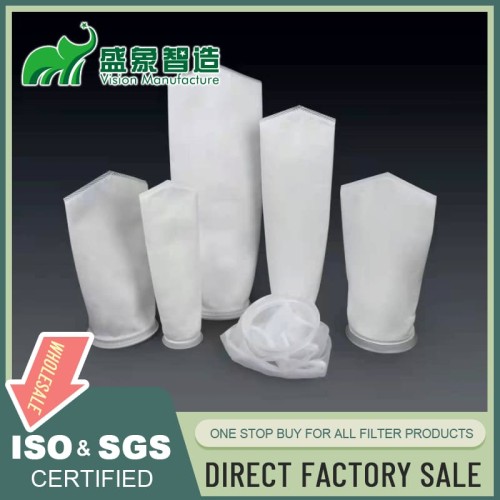
How Do 100 Micron Filter Socks Optimize Liquid Filtration in Industrial Processes?
I. Introduction
100 micron filter socks are essential components in industrial liquid filtration, offering a versatile solution that balances efficiency with operational demands. This article explores the significance of 100 micron filtration, the technology behind filter socks, and their pivotal role in enhancing industrial processes.
II. Understanding 100 Micron Filtration
- Micron Rating Explained: A micron is one-millionth of a meter. A 100 micron filter sock is designed to capture particles that are 100 microns in diameter, providing a medium level of filtration suitable for various applications.
- Particle Size Perspective: This size is effective for removing larger particulates that could harm equipment or affect product quality, without significantly impeding the flow rate.
- Filtration Efficiency at 100 Micron Level: These filters are particularly effective in environments where large particulate loads are common, providing an essential first step in a comprehensive filtration process.
III. Materials and Construction
- Fabric Options: Common materials include polyester, polypropylene, and nylon, each offering unique benefits such as chemical resistance, strength, and cost-effectiveness.
- Manufacturing Techniques: Techniques such as needle-punching and weaving are used to create robust bags that withstand operational demands.
- Seam Types and Strength Considerations: Critical for preventing bypass and ensuring the durability of the filter bags under operational stress.
- Surface Treatments and Finishes: Treatments like glazing or singeing are applied to enhance dust cake release and improve the cleanability of the bags.
IV. Design Features
- Sock Dimensions and Shapes: Available in various sizes and shapes to fit different systems and meet specific process requirements.
- Attachment Methods: Include features like rings or flanges for secure and easy installation.
- Reinforcement Options: Additional structural elements to withstand demanding operational conditions.
- Customization Possibilities: Tailored solutions to meet unique industry challenges.
V. Applications Across Industries
100 micron filter socks are utilized in:
- Chemical Processing: For removing impurities that can compromise chemical reactions and product purity.
- Water and Wastewater Treatment: Essential in protecting equipment and ensuring treated water meets regulatory standards.
- Food and Beverage Production: Used to ensure compliance with health and safety standards by removing particulates.
- Pharmaceutical Manufacturing: Critical for maintaining the sterility and purity of pharmaceutical products.
- Paint and Coatings Industry: Ensures the smoothness and consistency of paints and coatings by filtering out fine particulates.
- Oil and Gas Industry: Essential for the filtration of fluids and protection of equipment.
VI. Performance Characteristics
- Flow Rate Capabilities: Designed to handle high flow rates efficiently, reducing downtime and maintenance costs.
- Dirt-Holding Capacity: Capable of accumulating a significant amount of particulate matter before requiring cleaning or replacement.
- Pressure Drop Considerations: Minimized to ensure optimal system performance and reduce energy consumption.
- Chemical and Temperature Resistance: Materials are selected to withstand harsh chemicals and high temperatures encountered in industrial processes.
VII. Installation and Maintenance
- Proper Handling and Installation Techniques: Essential for preventing damage during installation and ensuring optimal performance.
- Cleaning Methods and Frequency: Includes techniques for effectively cleaning the bags to restore full functionality.
- Inspection for Wear and Damage: Regular checks help maintain system efficiency and prevent unexpected failures.
- Replacement Guidelines: Recognizing when bags need to be replaced is vital for maintaining system efficiency.
VIII. Advantages of 100 Micron Filter Socks
- Versatility in Liquid Filtration Applications: Suitable for a wide range of industries due to their moderate filtration level and high flow capacity.
- Cost-effectiveness: Offers a cost-efficient solution for many industrial applications due to the balance of performance and durability.
- Easy Installation and Replacement: Designed for quick and easy setup, reducing downtime and labor costs.
- Reusability (where applicable): Some materials allow for cleaning and reuse, extending the service life and reducing environmental impact.
IX. Comparative Analysis
- 100 Micron Socks vs. Other Filtration Methods: Demonstrates why 100 micron bags may be more suitable for applications requiring higher flow rates.
- Advantages over Cartridge Filters: Highlights the benefits of using sock filters over cartridge options, particularly in terms of maintenance and operational cost.
- Cost-Benefit Analysis in Various Applications: Evaluates the economic impact of choosing 100 micron bags, considering their performance and lifespan.
X. Environmental Considerations
- Reusability and Waste Reduction: Minimizes waste production by effectively capturing and retaining fine particulates.
- Energy Efficiency in Filtration Processes: Reduces energy consumption through efficient design.
- Proper Disposal and Recycling Practices: Ensures environmentally friendly disposal and potential recycling of used filters.
XI. Innovations and Future Trends
- Advanced Materials for Improved Performance: New materials that enhance filtration efficiency and durability.
- Smart Filter Socks with Monitoring Capabilities: Incorporation of sensors and monitoring technology to optimize performance and predict maintenance needs.
- Biodegradable Options for Eco-Friendly Filtration: Develops eco-friendly materials that degrade naturally without harming the environment.
XII. Case Studies and Success Stories
Examples from various industries demonstrate the effectiveness of 100 micron filter socks in enhancing filtration processes, solving specific challenges, and delivering significant improvements in efficiency and compliance.
XIII. Regulatory Compliance
- Industry Standards for Filtration Efficiency: Ensures that products meet or exceed industry-specific filtration standards.
- Food and Pharmaceutical Grade Requirements: Adheres to stringent regulations for products used in sensitive applications.
- Environmental Regulations: Complies with environmental standards to minimize the impact on the ecosystem.
XIV. Conclusion
100 micron filter socks are essential for maintaining high standards of purity and efficiency in many industrial and commercial applications. As technology advances, these filters continue to evolve, offering more effective and sustainable solutions for liquid filtration.
Leave a comment

